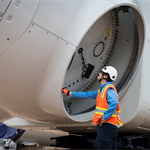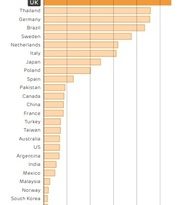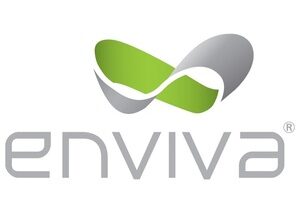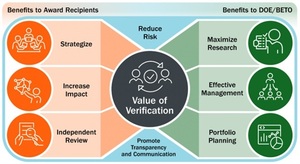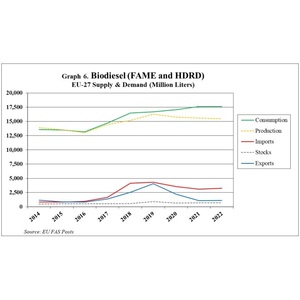Senators to Treasury: Adopt GREET for SAF tax credit
Energy Disrupter
ADVERTISEMENT
A group of 16 senators on June 16 sent a letter to U.S. Treasury Secretary Janet Yellen urging the agency to adopt the U.S. Department of Energy’s GREET model as the secondary methodology for calculating tax credits for sustainable aviation fuel (SAF). According to the senators, adopting GREET will dramatically enhance the effectiveness of SAF incentives to accelerate the aviation industry’s decarbonization.
“Failure to provide businesses with the certainty and reliability of a science-based, United States government-developed model to determine eligibility for IRA tax credits could have dire consequences,” the senators wrote. “Prohibiting the aviation industry from decarbonizing with the most readily available SAF options will not only prevent American farmers from contributing to a clean energy economy, but it will drastically delay adoption of promising low emission energy sources and force the aviation industry to miss an opportunity to eliminate millions of tons of carbon emissions in the coming years.”
Within the letter, the senators explain that the GREET model would enable SAF stakeholders to adapt to new developments and technical advances, making it “the only model that can lead to every participant in the SAF lifecycle having options to appropriately participate in carbon reducing processes.”
The letter outlines several specific reasons why Treasury should allow SAF producers to use GREET in determining the fuel’s lifecycle GHG emissions. As required by the Inflation Reduction Act, GREET is a “similar methodology” to the most recent CORSIA model, which has been adopted by the International Civic Aviation Organization. GREET also satisfies the criteria for lifecycle analysis under the Renewable Fuel Standard regulations.
In addition, the senators stress that GREET is used to calculate the lifecycle analysis related to other IRA tax credits, including those for hydrogen and clean fuels. “Notably, these provisions requiring the use of GREET for other transportation fuels and hydrogen reference the same definition of ‘lifecycle greenhouse gas emissions’ under the Clean Air Act as does IRC Section 40B,” the senators wrote. “Moreover, because some facilities will produce both aviation and non-aviation fuels at the same facility, to require them to utilize different models for aviation and nonaviation fuels will unnecessarily complicate the ability of these taxpayers to calculate credit values for these fuels.”
The senators also explain that using GREET for lifecycle analysis creates a system to reward farmers for climate-smart agricultural practices and introduces a market-driven approach to sustainability. Finally, they note that GREET is the most up to date, accurate model for U.S. domestic practices. “ICAO largely relies on data published between 2007-2012 and utilizes an averaging approach,” the senators wrote. “In fact, ICAO uses old GREET data but relies on out of date, static science and methodologies that unjustifiably penalize U.S. agriculture. In the last decade, the carbon intensity of biofuels has fallen by 20 percent or more, making the case that for a scientific model to be accurate it must be continuously updated with relevant data and methodologies. GREET has been updated at least five times in the last 9 years and relies on the best available science to assess direct emissions. GREET includes actual field testing and validation techniques and includes climate-smart agricultural practices and scientific innovations.”
The senators caution Treasury that failure to implement GREET will prohibit the majority of the current SAF market from benefiting from the IRA’s SAF tax credit while preventing industry from making further investments in SAF production and hindering carbon reduction.
The letter is signed by Sens. Tammy Duckworth, D-Ill.; Richard Durbin, D-Ill.; Deb Fischer, R-Neb.; Joni Ernst, R-Iowa,; Amy Klobuchar, D-Minn.; Chuck Grassley, R-Iowa; Patty Murray, D-Wash.; Sherrod Brown, D-Ohio; Debbie Stabenow, D-Mich.; Tina Smith, D-Minn.; Roger Marshall, R-Kan.; Gary Peters, D-Mich.; John Thune, R-S.D.; Tammy Baldwin, D-Wisc.; Michael Rounds, R-S.D.; and Pete Ricketts, R-Neb.
Duckworth earlier this month introduced the Sustainable Aviation Fuels Accuracy Act of 2023, a bipartisan bill that aims to identify the standards required to meet the definition of SAF at the Federal Aviation Administration. The bill would, in part, require the federal government to adopt the most up-to-date lifecycle emissions models, including GREET or successor life-cycle analysis models to GREET. Fischer, Ernst, Klobuchar and Grassley have signed on to cosponsor the bill.
Growth Energy has spoken out in support of the senators’ letter to Treasury.
“It would be climate malpractice to anchor our SAF ambitions to outdated models that disregard U.S. innovations in biofuel production and climate-smart agriculture,” said Emily Skor, CEO of Growth Energy. “With current technologies, farm-based feedstocks are the only sources of clean, renewable energy available in large enough volumes to deliver on our decarbonization goals. Fortunately, researchers at the U.S. Department of Energy (DoE) have developed the gold standard for lifecycle modeling, informed by the latest hard data on everything from indirect land use change to fertilizer inputs. Only with the best available science guiding incentives can we unlock the innovations and investments needed to meet this administration’s SAF Grand Challenge. We applaud Senator Duckworth and our other Senate champions for working to ensure U.S. SAF production isn’t grounded before it can ever take off.”
A full copy of the letter is available on the Growth Energy website.









